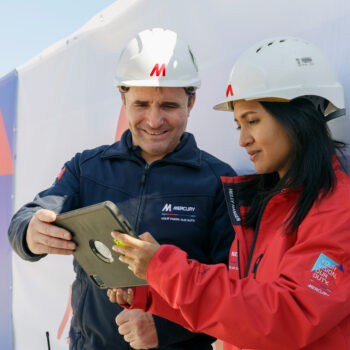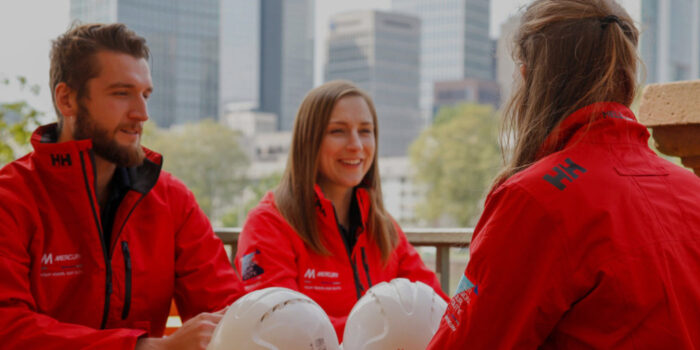News & Insights

Siobhan McBarron on the challenges of working with Muscular Dystrophy
September marks Muscular Dystrophy Awareness Month. The muscular dystrophies (MD) are a group of inherited genetic conditions that gradually cause the muscles to weaken, leading to an increased level of disability over time. Siobhán McBarron, Site Administrator with Mercury based in Gälve, Sweden, spoke to us about the challenges of living and working with muscular dystrophy, as well as diversity and inclusion practices at Mercury.
Diversity and Inclusion are at the core of Mercury’s mission, and as an industry leader with over 8,500 employees across 16 countries, from 46 different nationalities, we strive to provide an equal, innovative, and inclusive workplace for all.
One of Mercury’s EDI agendas for this year is to continue raising awareness of being differently-abled. Siobhán’s interview offers an insightful look at the day-to-day challenges of living with a disability and how an inclusive workplace can help to alleviate some of these issues.
Scroll below to read Siobhán’s full insight.
What is Muscular Dystrophy?
“Muscular Dystrophy is a disease that causes progressive weakness and degeneration of the skeletal muscles. The type I have is known as ‘Limb Girdle Muscular Dystrophy’, it essentially involves the continuous deterioration of large muscles in my legs. I am also a two-time breast cancer survivor and have had to deal with the long-term effects of chemotherapy such as nerve damage which resulted in requiring a walking cane for assistance with my mobility. The chemo further aggravated my muscular dystrophy which caused my symptoms to advance earlier than expected.”
How has being diagnosed with Muscular Dystrophy affected your career to date?
“I was diagnosed with Muscular Dystrophy 15 years ago and knew from research that it would start to develop more severely leading into my mid-thirties. As a result, I had to make changes and rethink my career path. I had to grieve for my life less lived to embrace the life I would have now and the challenges I would face due to being diagnosed with MD. I think this is an unspoken truth about facing a life altering medical condition that people do not speak about. I originally envisioned a career in the sport and fitness industry, and this was no longer possible as a result of the diagnosis.”
What does Diversity & Inclusion at Mercury mean to you?
“I am really thankful for my job with Mercury. It allows me to feel independent and worthy for contributing, not only in the workplace but also to society in a broader sense. At Mercury I feel like a valued employee working as part of a team with a common goal. I am grateful to work alongside such supportive colleagues within a company that values diversity and inclusion at every level of the workplace.
“I cherish working in a healthy environment where everyone is treated equally, and where one’s ability, and not their disability is valued.”
What issues have you encountered since moving to Sweden?
“Moving to a new country to work comes with challenges for everyone but these have been compounded by my muscular dystrophy. I work from home so everything that I need is available to me here. Construction sites are a total no-go area for me. I struggle with small things here and leaving the house involves a lot of research, planning and co-ordination. I have to consider things such as accessibility to buildings, car park locations, restaurants and bars.”

Have there been any support functions that have helped you succeed in your role?
“Being able to work from home has proved very beneficial. Thanks to the pandemic companies are adapting to new working methods which are more versatile and inclusive and it proves that employees can continue to be just as productive. Having great colleagues at Mercury who are understanding of my situation has also been a huge help. I know that I can rely on them, and together we promote a positive culture and work-life balance. I get great satisfaction from being part of a team.”
What is the most important information you believe that people should know about muscular dystrophy?
“The most difficult part about my disability is that people see my walking stick before they get to know me. Unfortunately, there is no cure for this disease, it ends up eating away at your body, and consequently your independence. Behind my smile and warm personality is a woman learning to accept that one day I will be totally dependent on a wheelchair. My daily challenges are not just physical- having a disability also comes with mentally draining obstacles and it’s important for people remember that just because my legs do not work like theirs, this has not affected my intelligence and I should not be treated any different.”
DIVERSITY & INCLUSION
Diversity & Inclusion forms part of Mercury’s Responsible Business programme, and is a key factor behind our winning culture
We have put in place a Diversity & Inclusion Policy that is driven by our Executive Management Team. Diversity & Inclusion is woven into the fabric of the vision and values of Mercury, not only through our culture, but through the entire life cycle of the employee experience.
Like Mercury on Facebook.
Follow us on LinkedIn, Twitter, and Instagram.


